Samaaro + Your CRM: Zero Integration Fee for Annual Sign-Ups Until 30 June, 2025
- 00Days
- 00Hrs
- 00Min
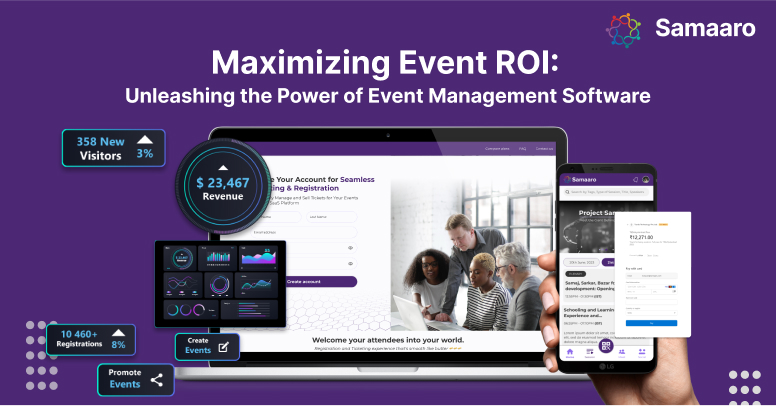
In today’s competitive business landscape, organizing successful events is crucial for companies to achieve their goals. Whether it’s a corporate conference, trade show, product launch, or a marketing event, the importance of maximizing Event Return on Investment (ROI) cannot be overstated. Every event represents a significant financial and resource investment, and understanding how to drive success is paramount to reap the desired benefits.
Return on investment (ROI) for an event is not solely financial. Generating revenue and increasing profits are important, but successful events also contribute to brand building, networking, lead generation, and customer engagement. Maximizing ROI for an event allows organizations to tap into the totality of the opportunities that existed, driving long-term business growth and a competitive position in the marketplace.
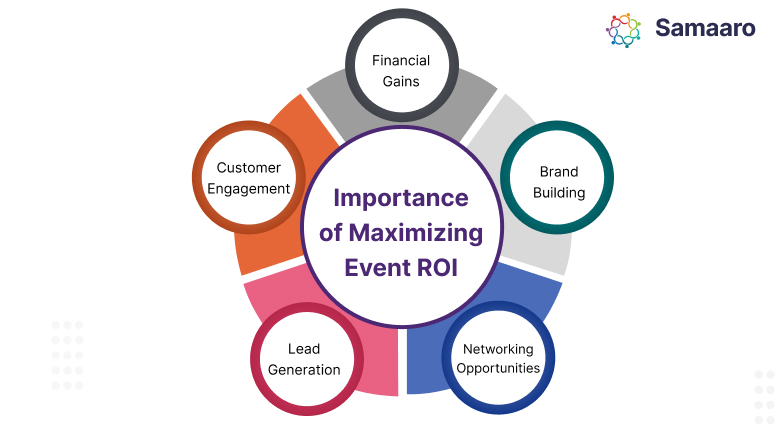
There are a number of factors that can contribute to the overall success of an event, and thus its ROI. These elements may include:
Quantifying event ROI can be challenging due to many of the intangibles involved with events. Several challenges arise with regards to:
This is where event management software plays an important role and can help to overcome many challenges associated with maximizing the ROI of your event by utilizing technology to simplify the planning process, execution of the event, and analysis.
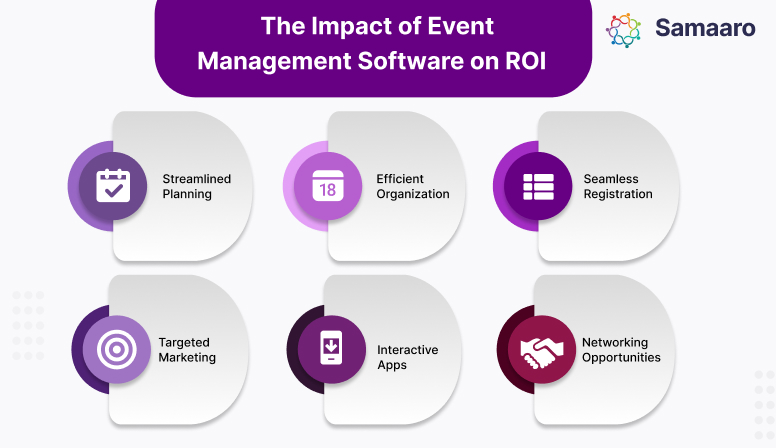
Event management software is instrumental in driving the success of events and ROI. It provides a comprehensive set of tools and features and can streamline the event planning, organization, marketing, and engagement process. Event planners can strategically make decisions, better attendee experience, and ultimately reach their goals by utilizing technology, an example of these tools is event management software.
In conclusion, event management software is truly a powerful vessel in maximizing event ROI. Event management software simplifies and organizes the planning process, simplifies the registration process, and manages the marketing process in parallel with the event to maximize attendee experience and engagement. This process allows event organizers to design and produce successful events that offer quantifiable outcomes for the attendee and leave a lasting impression on attendees and stakeholders. Employing technology-driven solutions is critical to competitiveness with the fast-paced changing world of events while generating success for businesses and organizations themselves.
Scalability is an essential feature of event management software in terms of flexibly adjusting its capacity to meet events that vary in size or complexity. Whether you are organizing a small workshop, or a large-scale conference, the software should be able to meet the needs of the point of reference regardless and provide an organized manner through and through. Scalability allows event coordinators to accommodate more attendees and data without sacrificing performance and user experience.
In event management, personalization is a growing priority for improving attendee satisfaction and engagement. Event management software that can accommodate personalization adjusts the event experience according to individual participant preferences. This can range from personalized agendas to recommendations for sessions/activities, to personalized communications. By enhancing the experience with personalized features, organizers can create stronger connections with participants and increase satisfaction, which leads to greater ROI.
A key component of event management software is seamless integrations with other business tools.
By discussing key features within the event management space, software can increase productivity, provide personalization, provide a streamlined process, and assess performance. When event managers have technology that supports and enhances each aspect of event management, and generates memorable and valuable experiences, then they will see improved event ROI.
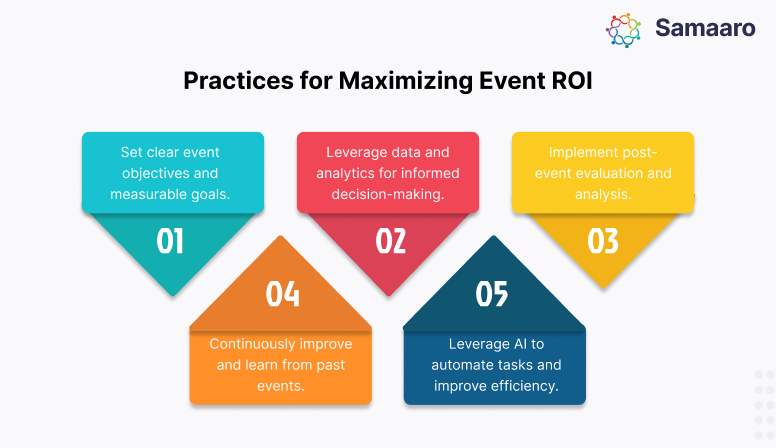
Event management software can be a powerful tool for maximizing event ROI. By using event management software, you can:
Before launching an event, it is essential to define clear objectives and set measurable goals. Event management software enables organizers to track key performance indicators (KPIs) such as
To maximize the event’s success, use event management software to set benchmarks and performance targets for each KPI, and align event strategies and planning with the defined objectives and goals, ensuring a focused and purposeful event.
Once you have set clear event objectives and measurable goals, you can use data and analytics to make informed decisions about your event. For example, you can use data to:
By using data and analytics, you can make better decisions about your event and improve your chances of success.
After your event is over, it is important to evaluate your results and identify areas for improvement. You can use event management software to collect feedback from attendees, track sales leads, and measure the overall success of your event.
This information will help you improve your event planning process for future events. By continuously evaluating and improving, you can ensure that your events are more successful over time.
The best way to maximize event ROI is to continuously improve and learn from past events. This means taking the time to analyze your data, identify areas for improvement, and make changes to your event planning process.
For example, if you notice that your attendance numbers are declining, you could try changing your marketing strategy or offering more relevant content. If you find that your attendees are not engaged, you could try changing the format of your sessions or adding more networking opportunities.
By continuously improving, you can ensure that your events are more successful over time.
Event management software can also be used to automate tasks and improve efficiency.
For example, you can use event management software to automatically send out confirmation emails, track RSVPs, and manage speaker payments. By automating tasks, you can free up your time to focus on other aspects of event planning.
This can save you a lot of time and energy, which can help you make your events more successful.
In conclusion, in today’s fast-paced and competitive landscape, investing in event management software has become a strategic imperative for businesses and organizations seeking to thrive in the events industry. With the right event management platform, such as Samaaro, event organizers can streamline their operations, enhance attendee experiences, and optimize resource utilization, ultimately leading to better returns on investment (ROI). From seamless registration and ticketing processes to interactive networking opportunities and real-time analytics, Samaaro empowers event organizers to orchestrate successful events that leave a lasting impact on participants and stakeholders alike. By leveraging the power of event management software, businesses can unlock new possibilities, drive growth, and stay ahead of the curve in an ever-evolving events landscape.

Built for modern marketing teams, Samaaro’s AI-powered event-tech platform helps you run events more efficiently, reduce manual work, engage attendees, capture qualified leads and gain real-time visibility into your events’ performance.
Location
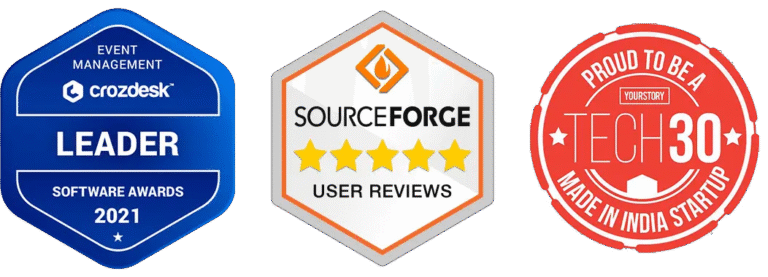
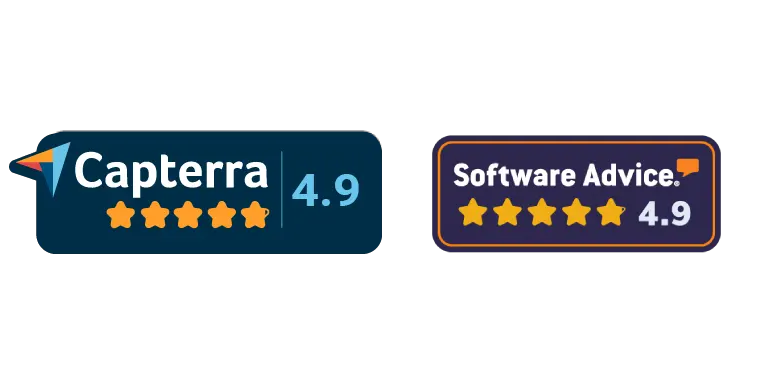
© 2026 — Samaaro. All Rights Reserved.